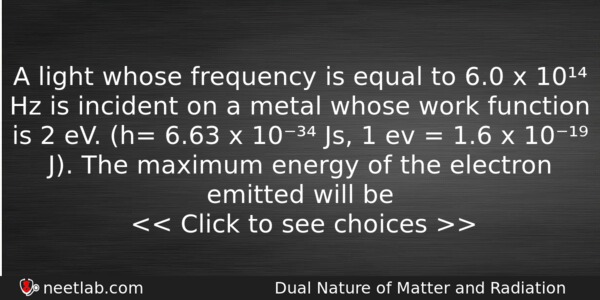| ⇦ | 
| ⇨ |
A light whose frequency is equal to 6.0 x 10¹⁴ Hz is incident on a metal whose work function is 2 eV. (h= 6.63 x 10⁻³⁴ Js, 1 ev = 1.6 x 10⁻¹⁹ J). The maximum energy of the electron emitted will be
Options
(a) 2.49 eV
(b) 4.49 eV
(c) 0.49 eV
(d) 5.49 eV
Correct Answer:
0.49 eV
Explanation:
No explanation available. Be the first to write the explanation for this question by commenting below.
Related Questions: - Two bodies of mass 10 kg and 5 kg moving in concentric orbits of radius
- The number of photons of wavelength of 540 nm emitted per second by an electric bulb
- The work function for aluminium is 4.125 eV. The cutoff wavelength for photoelectric
- The minimum wavelength of X-rays produced in a Collidge tube operated
- The electrons are emitted in the photoelectric effect from a metal surface
Topics: Dual Nature of Matter and Radiation
(150)
Subject: Physics
(2479)
Important MCQs Based on Medical Entrance Examinations To Improve Your NEET Score
- Two bodies of mass 10 kg and 5 kg moving in concentric orbits of radius
- The number of photons of wavelength of 540 nm emitted per second by an electric bulb
- The work function for aluminium is 4.125 eV. The cutoff wavelength for photoelectric
- The minimum wavelength of X-rays produced in a Collidge tube operated
- The electrons are emitted in the photoelectric effect from a metal surface
Topics: Dual Nature of Matter and Radiation (150)
Subject: Physics (2479)
Important MCQs Based on Medical Entrance Examinations To Improve Your NEET Score
18000+ students are using NEETLab to improve their score. What about you?
Solve Previous Year MCQs, Mock Tests, Topicwise Practice Tests, Identify Weak Topics, Formula Flash cards and much more is available in NEETLab Android App to improve your NEET score.
Share this page with your friends

Leave a Reply